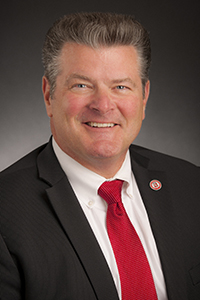How the �鶹���Ǹ���Ժ Created Silver Linings Amid the Clouds of the Coronavirus
July 25, 2021
By Chancellor, �鶹���Ǹ���Ժ
 Tedd L. Mitchell, M.D.
Tedd L. Mitchell, M.D.When the coronavirus pandemic hit campuses across the country, some in higher education thought our sector was done for. But if the past 18 months have shown us anything, it is just how vital an asset a university system can be to a community during a time of crisis.
Right away, the �鶹���Ǹ���Ժ sprang into action against the pandemic, led by the efforts of our health-related institutions, Texas Tech University Health Sciences Center and Texas Tech University Health Sciences Center El Paso. The faculty, students and staff across our four universities did everything from making personal protective equipment using 3D printing to producing Viral Transport Medium to treating patients who contracted the virus.
Much credit goes to �鶹���Ǹ���Ժ’s Jerry H. Hodge School of Pharmacy as well as The Institute of Environmental and Human Health’s biosafety level three laboratory at Texas Tech University for their pioneering, time-sensitive work—including efforts recognized by our governor, Greg Abbott.
Our institutions’ COVID-19 efforts went beyond path-breaking medical advances—encompassing simple actions and quiet decency. Angelo State University, for instance, supported the local medical staff from Shannon Medical Center and San Angelo Community Medical Center. As they were conducting daily COVID tests in their community, ASU opened its residence hall to provide these individuals with a place to stay, so they would not risk infecting their own families at home.
Our response to the crisis was resolute across our campuses. Our faculty and staff quickly shifted gears and moved courses online, and their efforts during spring of 2020 enabled thousands of students to graduate on time amid the pandemic. We proved we could continue to teach, train and educate our students with a quality education remotely. While all of us would have preferred in-person instruction, learning digitally was better than no learning at all.
What last year proved was our universities’ adaptability and flexibility. It showed our “campuses” don’t live exclusively in our buildings and quads, but in the teaching, research and instruction that takes place wherever our students and faculty may be.
That said, when we began to reopen our campuses, I am proud to say that we kept our universities safe. At one point, our academic locations were among the safest places one could be in our communities—and that is because we took extraordinary steps to distribute PPE, encourage social distancing, and sanitize the air and surfaces in classrooms. Our staff performed nearly round-the-clock heroics as the virus evolved, and for that, they deserve enormous credit.
Some assets we had strengthened over many years became more relevant than they have ever been. For decades, �鶹���Ǹ���Ժ has been a leader in telemedicine, and during no year has that skill set and competency mattered more than during the pandemic. We planted the seeds for remote clinical work without knowing what this last year would bring, and our efforts have proved sustainable and relevant to the needs of our neighbors.
As we look ahead, I think we can double-down on what this past year showed us: Namely, that our universities have always been able to aid the state and solve difficult problems. If we look at everything from broadband access to workforce development, the TTU System has a critical role to play, and we can build on this momentum and attack those problems with energy and ambition.
This was as hard of a time as our university system and our state has ever faced, but for all the difficulty, I am encouraged by the many ways in which our students, faculty, staff and dedicated supporters showed up and took action. We ended this academic year stronger—in both easily measurable metrics like collective enrollment, but also in less quantifiable manners as well. We have seen what our universities can do and accomplish in a crisis, and our resolve amid the difficulty can hold us in good positions in the years to come.
Tedd L. Mitchell is chancellor of the �鶹���Ǹ���Ժ. He wrote this column for the Lubbock Avalanche-Journal and Amarillo Globe-News.
About the �鶹���Ǹ���ԺEstablished in 1996 and headquartered in Lubbock, Texas, the is a $2 billion higher education enterprise focused on advancing higher education, health care, research and community outreach. Consisting of four universities – , , and – the TTU System collectively has approximately 55,000 students, 17 campuses statewide and internationally, more than 300,000 alumni and an endowment valued at over $1.3 billion.
During the 86th Texas Legislature under the leadership of Chancellor , legislative funding and authority was provided to establish a new Texas Tech University veterinary school in Amarillo and a new dental school at Texas Tech University Health Sciences Center El Paso. This will be the state’s first veterinary school in more than a century and first dental school in over 50 years. The addition of these two schools makes the �鶹���Ǹ���Ժ one of only nine in the nation to offer programs for undergraduate, medical, law, nursing, pharmacy, dental and veterinary education, among other academic areas.

